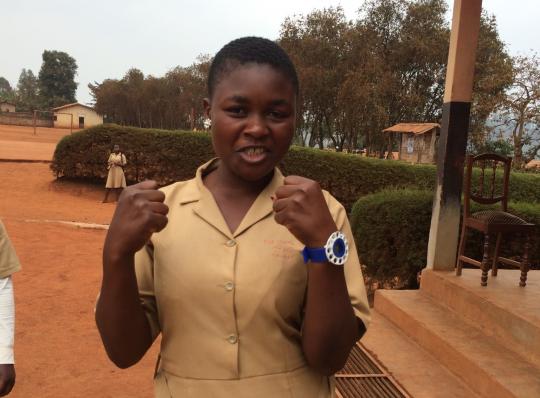
Also available in: Français
I’ll admit there was a tiny part of me that wanted to do that whole Angelina Jolie thing – go deep into the heart of a developing country and be surrounded by a gaggle of school children, whom I would go on to pinch, squeeze, and coddle. Last I checked I was not an UNHCR ambassador (and zero movie credentials), so instead I found myself face to face with four resolute high school students in the western region of Cameroon asking in broken French: What does corruption mean to you?
“It means to give money, to be sexually harassed, to be absent from school and then to pay teachers to say you were present,” said Floriane Masso, a student of a government school of Bamendjou. Masso is one of many students who are part of Clubs d’Education Civique et d’Integration Nationale (Cecine) established under the ZENU Network. With financing of about $15,000 from a Development Marketplace competition organized under a $1.8 million “Banking on Change” Governance Program in Cameroon--funded by the Governance Partnership Facility (GPF)—the ZENU Network set out to fight corruption in 16 high schools across 8 districts in the Western parts of Cameroon. One of the tools used were to put in place “corruption observatories.” The activity focused on victims of corruption and provided a whistleblowing mechanism, while pressuring authorities to impose sanctions for corrupt behavior.
According to a recent assessment, ZENU’s efforts have been fruitful: the whistleblowing system generated 112 claims of corrupt or indecent behavior in 2013 and led to the firing of four staff. Cases were brought against a total of 15 staff, who were subject to administrative sanctions in 2013. But not all cases are successful. “We had an example of a sexual abuse case filed against a teacher and it was not true,” said Masso.
Last month, the network, and other CSOs from around Cameroon (and I), participated in a Governance Forum on Multi-Stakeholder Engagement held in Yaoundé. Over 130 organizations and individuals took part in the Forum, which showcased multi-stakeholder initiatives (MSIs) that are already present in Cameroon or that may bring value to on-going efforts to strengthen multi-stakeholder engagement for improved governance. MSIs such as Open Contracting, Extractives Industries Transparency Initiative (EITI), Construction Sector Transparency Initiative (CoST), and Medicines Transparency Alliance (MeTA) were some of the examples highlighted.
Governance is a cross-cutting theme in the World Bank’s Country Assistance Strategy (CAS) for 2010-2014, and challenges include weak governance (Cameroon has been ranked in the bottom 25th percentile for all governance indicators in the past 10 years); inequity in service delivery; and according to a 2007 household survey, around 40 percent of the population are living below the poverty line. Cia Sjetnan, TTL for the governance program, said the GPF funding allowed the team to be innovative and flexible—trying and testing new and various approaches to governance. “We took risks and opportunities, and it really paid off,” she said.
Indeed, it brought together a variety of stakeholders to the table to discuss the role of civil society as well as a recent report published by MSI Integrity on significant shortcomings of multi-stakeholder governance in most countries. In fact, none of the countries, including Cameroon, assessed met all the governance requirements of EITI’s new rules, the EITI Standard.
The ZENU Network wants to be part of the EITI process as well: working with local governance councils and Parent-Teachers Associations, it hopes to establish more corruption observatories for schools and increase awareness among the local population. But even with more resources, how can an entire country take on endemic corruption?
The answer, once again, was from a resolute high school president who was tired of discussing corruption from the classroom to the football field. “Some students don’t believe it is possible to fight those in the government,” said Jean Roger Chendjou. “But the youth must fight. If we fight back, it is possible to have Cameroon free of corruption. We have seen the change in 5 years by denouncing our corrupt teachers.”


Join the Conversation